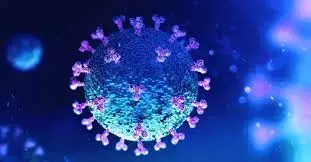- Home
- Medical news & Guidelines
- Anesthesiology
- Cardiology and CTVS
- Critical Care
- Dentistry
- Dermatology
- Diabetes and Endocrinology
- ENT
- Gastroenterology
- Medicine
- Nephrology
- Neurology
- Obstretics-Gynaecology
- Oncology
- Ophthalmology
- Orthopaedics
- Pediatrics-Neonatology
- Psychiatry
- Pulmonology
- Radiology
- Surgery
- Urology
- Laboratory Medicine
- Diet
- Nursing
- Paramedical
- Physiotherapy
- Health news
- Fact Check
- Bone Health Fact Check
- Brain Health Fact Check
- Cancer Related Fact Check
- Child Care Fact Check
- Dental and oral health fact check
- Diabetes and metabolic health fact check
- Diet and Nutrition Fact Check
- Eye and ENT Care Fact Check
- Fitness fact check
- Gut health fact check
- Heart health fact check
- Kidney health fact check
- Medical education fact check
- Men's health fact check
- Respiratory fact check
- Skin and hair care fact check
- Vaccine and Immunization fact check
- Women's health fact check
- AYUSH
- State News
- Andaman and Nicobar Islands
- Andhra Pradesh
- Arunachal Pradesh
- Assam
- Bihar
- Chandigarh
- Chattisgarh
- Dadra and Nagar Haveli
- Daman and Diu
- Delhi
- Goa
- Gujarat
- Haryana
- Himachal Pradesh
- Jammu & Kashmir
- Jharkhand
- Karnataka
- Kerala
- Ladakh
- Lakshadweep
- Madhya Pradesh
- Maharashtra
- Manipur
- Meghalaya
- Mizoram
- Nagaland
- Odisha
- Puducherry
- Punjab
- Rajasthan
- Sikkim
- Tamil Nadu
- Telangana
- Tripura
- Uttar Pradesh
- Uttrakhand
- West Bengal
- Medical Education
- Industry
NIH researchers find brain damage in COVID-19 patients

USA: The researchers from US NIH found brain damage caused by thinning and leaky brain blood vessels in patients who died of COVID-19. In addition, they saw no signs of SARS-CoV-2 in tissue samples suggesting that the damage was not caused by a direct viral attack on the brain. The results of the study were published in the New England Journal of Medicine as a correspondence.
The researchers found that the brains of patients who contract infection from SARS-CoV-2 may be susceptible to microvascular blood vessel damage. Although COVID-19 primarily manifests in the respiratory system, patients also experience neurological complications including headaches, delirium, cognitive dysfunction, dizziness, fatigue, and loss of the sense of smell. The reason for these complications isn't yet understood. Avindra Nath, National Institute of Neurological Disorders and Stroke, Bethesda, MD, and colleagues performed a postmortem high-resolution magnetic resonance imaging (magnetic resonance microscopy) of the brains of patients with coronavirus disease 2019 (Covid-19) (median age, 50 years) and histopathological examination that focused on microvascular changes in the olfactory bulb and brain stem.
Images were obtained from the brains of 13 patients with the use of an 11.7-Tesla scanner at a resolution of 25 μm for the olfactory bulb and at a resolution of 100 μm for the brain. Abnormalities were observed in brains of 10 patients. By means of multiplex fluorescence imaging (in 5 patients) and by means of chromogenic immunostaining (in 10 patients) the researchers then examined the brains of those patients that showed abnormality
Conventional histopathological examination of the brains of 18 patients was performed. Fourteen patients had chronic illnesses, including diabetes and hypertension, and 11 had been found dead or had died suddenly and unexpectedly. Of the 16 patients with available medical histories, 1 had delirium, 5 had mild respiratory symptoms, 4 had acute respiratory distress syndrome, 2 had pulmonary embolism, and the symptoms were not known in 3.
Key findings of the study include:
- The MRI scans revealed hyperintensities and hypointensities, which the investigators then examined more closely under a microscope.
- The hyperintensities had blood vessels thinner than normal and that sometimes leaked proteins into the brain, which triggered an immune reaction.
- The hypointensities included clotted and leaky blood vessels but no immune response.
"We hope these results will help doctors understand the full spectrum of problems patients may suffer so that we can come up with better treatments," wrote the authors.
"So far, our results suggest that the damage we saw may not have been not caused by the SARS-CoV-2 virus directly infecting the brain," Nath said. "In the future, we plan to study how COVID-19 harms the brain's blood vessels and whether that produces some of the short- and long-term symptoms we see in patients."
The correspondence titled, "Microvascular Injury in the Brains of Patients with Covid-19," is published in the New England Journal of Medicine.
DOI: https://www.nejm.org/doi/full/10.1056/NEJMc2033369
Dr Kamal Kant Kohli-MBBS, DTCD- a chest specialist with more than 30 years of practice and a flair for writing clinical articles, Dr Kamal Kant Kohli joined Medical Dialogues as a Chief Editor of Medical News. Besides writing articles, as an editor, he proofreads and verifies all the medical content published on Medical Dialogues including those coming from journals, studies,medical conferences,guidelines etc. Email: drkohli@medicaldialogues.in. Contact no. 011-43720751


